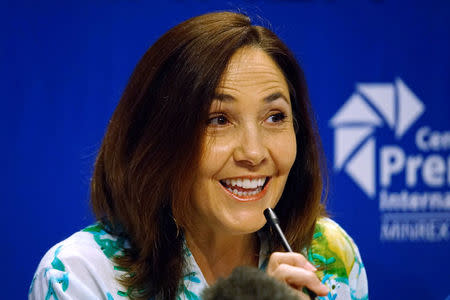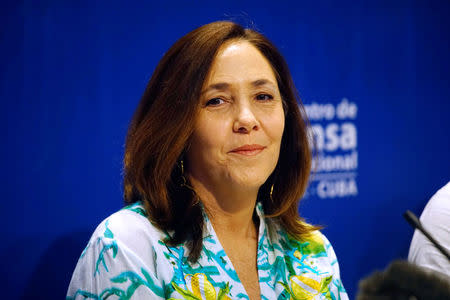Raul Castro's daughter says would not want to be Cuban president
By Sarah Marsh HAVANA (Reuters) - With Cuban President Raul Castro set to step down next year, his daughter Mariela Castro said on Wednesday she would never want to be a contender for the presidency, but that there was room for surprises in the succession process. Raul, 85, who took the reins from his older brother, the late revolutionary leader Fidel Castro, has said he will step down in February 2018 at the end of a second five-year term. His heir apparent is Cuba's First Vice President Miguel Diaz-Canel, 57, and experts say the latter would have to stumble badly for someone else to leapfrog him in Cuba's arcane system for choosing its leader. Still, speculation there could be other candidates is rife on the Communist-ruled island. Mariela Castro, 54, a lawmaker and director of the Cuban National Center for Sex Education (CENESEX), was evasive when asked about the issue at a CENESEX news conference. "The men and women of the people of Cuba are candidates," she told reporters. "I don't say: 'We are,' because I will never let myself be nominated for such a big task." "Sometimes, you orientate yourself one way and then suddenly, you look over there, and you say: 'How interesting is this person whom I hadn't checked out before,'" she said. "There are always surprises." Names that have been bandied around as possible alternatives to Diaz-Canel are Alejandro Castro Espin, another child of the current president and one of his closest aides, and foreign minister Bruno Rodriguez. Castro Espin played a key role in the secret negotiations leading up to the rapprochement between Cuba and the United States, although he ruled out succeeding his father in a 2015 interview. Rodriguez meanwhile has a high public profile as Cuba's top diplomat, most recently touring Europe. Still, Cuba experts say Diaz-Canel has clearly been groomed for the job and the government would unlikely want to risk political stability by appointing someone with less legitimacy. "Perhaps she wanted to inject an element of excitement into what otherwise appears to be a pre-determined top-down bureaucratic selection," said Richard Feinberg, author of "Open for Business: Building the New Cuban Economy". Surprises were always possible, he added, but he doubted the rumours of another Castro. "That would be a grave mistake by the Cuban Communist Party leadership, as it would make Cuba appear to be a family dynasty, rather than an institutionalized polity," he said. (Additional reporting by Nelson Acosta; Editing by G Crosse and Andrew Hay)

 Yahoo News
Yahoo News 


